In the UK today, millions of people on low incomes are paying hundreds of pounds more each year for essential services, including their energy bills. This injustice is known as the poverty premium.
There are several causes of the energy poverty premium including higher charges for people who pay for their energy once they receive their bill, rather than having a direct debit set-up (standard credit); and lack of access to cheaper tariffs.
We’ve partnered with Rooted Finance to better understand how this poverty premium is affecting the users of their debt advice services as they recently contributed to research by Impact on Urban Health and conducted by Clear Consultancy Services, which reveals the devastating impact of energy debt on individuals, households, and the debt advice sector.
Rooted Finance, as a Black-led debt and financial inclusion charity, sits at the intersection of the poverty and ethnicity premium. The ethnicity premium describes the additional costs for goods and services, and the barriers to equal economic participation, experienced by people from Black and Minority Ethnic communities. To date, the underpinnings and implications of fuel poverty have yet to be explored effectively through ethnic and racial lines.
The scale of energy debt
Household energy debt is rising rapidly. It reached £4.43bn earlier this year, which is 194.3% higher than it was just five years ago. By comparison real wages grew by 5% (this is adjusted for inflation, reflecting the actual purchasing power of your income).
It is unsurprising then that Rooted Finance is seeing the need for energy debt advice rise at an alarming rate amongst their clients. In 2024/25 42% of people supported by Rooted Finance had energy debt. Energy debt, both in value and volume, is the fastest growing debt amongst Rooted Finance’s clients over the last three years – particularly amongst racialised communities.
Rooted sees that energy debt doesn’t affect everyone equally. In 2024/25, the users of their debt advice services for energy debt were:
- 64% living with long-term health conditions
- 62% Black and minority communities
- 43% living in social housing
Rooted Finance’s experience of working with communities shows that the ethnicity premium has a compounding affect. Their Black and racially minoritised clients are 1.5 times more likely to be in energy debt. These clients have higher unemployment rates, low and irregular wages, as well as limited career progression in low-paid sectors which ends in fuel poverty and other problem debt.
The human cost of energy debt
When they can, people experiencing energy debt are often reducing their energy consumption. This doesn’t just leave households facing financial issues – cold and damp homes are linked to serious health issues including respiratory conditions, cardiovascular disease, poor mental health, and childhood development problems. Affordability must never rely on people dangerously rationing the energy they need to stay warm. In addition, many people experiencing fuel poverty are going without other necessities such as food, which is exacerbating poor health outcomes
A Rooted Finance Case Study
*Albert is a 74-year-old Black African man residing in social housing in North London, where he serves as the primary caregiver for his wife. He grapples with several health issues, including diabetes, depression, and high blood pressure, which have compounded their challenges, leaving them feeling anxious and in need of assistance.
Their path to financial stability has been fraught with difficulties. It took numerous appointments and phone calls to fully understand the extent of their financial hardships.
During the first meeting, Albert appeared visibly distressed and could only share limited details about his debts; he had only brought along his car logbook as documentation. As we continued our advice appointment, it became apparent that Albert had multiple debts, including rent and council tax arrears, a significant number of unpaid parking fines, and utility and energy arrears. His creditors were persistently contacting him through letters and phone calls, which caused him stress and left him feeling unsure what to do.
It took a considerable amount of time to work through all of Albert’s debts due to him not being able to manage the volume of information needed from him to complete the debt advice process. That information is critical in ensuring we were providing him with tailored advice. For one of his energy debts, we needed to confirm the debt balance owed on his account and we reached out to the energy provider to confirm the outstanding account balance for the purpose of processing a Debt Relief Order (DRO). The provider’s customer service representatives claimed there was no balance owed, despite our advisor referencing a letter received from the energy provider stating Albert owed £1,056.93.
The customer service advisor remained firm there were no arrears. On enquiring if perhaps the debt had been sent to a debt collection agency, we were abruptly told that no further information could be shared with us. Our advisor was transferred between three separate departments, spending almost an hour speaking to different agents to verify an account balance, with no solution. We advised the energy provider that we would add the debt balance to the DRO application, as per their recent communication to our client. This was to ensure the energy provider did not subsequently say Albert owed money post a Debt Relief Order (DRO) submission.
Despite this, Albert then began to receive letters and phone calls from a debt collection agency informing him – a week after his DRO was submitted – that his energy debt had been passed on to them. We coached Albert to inform the debt collection agency that he now had a Debt Relief Order in place. We then lodged a complaint against the energy provider for providing inaccurate information.
We have observed that these issues relate to providers migrating accounts to a new system as we have had similar issues with other clients and different providers. On all occasions our advisers were told clients did not have debts, but the enforcement action letters were received a few weeks later.
The Impact and outcome achieved for Albert
- DRO debt write off £28,530
- Maximised annual household income by over £9,600
- Added client to Priority Register and Warm Home Discounts (saving a further £150 off their annual bill)
*Clients name has been changed
So what do we do?
Fair By Design is calling for reform to energy pricing structures:
- Introduce a targeted discount for low-income households that is designed to make sure everyone can afford enough energy to keep them safe and well. Eligible low-income households should automatically receive this discount, and eligibility should be based on income.
- Eliminate the standard credit premium. This is the extra cost paid by consumers who pay their bill when they receive it compared to those who pay by direct debit.
- Ofgem must fully develop its proposals for an ambitious debt matching/debt relief scheme to ensure people can escape the shackles of debt they found themselves in during the energy crisis.
- Ofgem should carry out a full distributional analysis of the pending move to market-wide half-hourly settlement, which could exacerbate the poverty premium.
Rooted Finance is calling for:
- Current solutions to tackle fuel poverty expanded to include community-led and culturally appropriate approaches to help improve energy efficiency and support those in acute energy debt
- Energy providers examine the link between ethnicity and disproportionate levels of energy debt – working with trusted intermediary organisations that have lived experience and co-production values underpinning their work
- Increased funding for community-based debt advice services, energy suppliers, given the significant increase in energy bills and energy debts. More funding allows organisations like Rooted Finance to reach more people earlier and prevent deeper crises.
- Improved customer service for clients facing energy debt. Partnering with organisations that support consumers in debt to codesign support and referral pathways. The difficulty in working with energy providers drives consumers into deeper debt and creates additional demand for debt advisers (especially community-based sector) As highlighted in our case study above.
We are both advocates for embedding lived experience and inclusive design principles into the energy market to ensure energy policies, regulations and tariffs are fair and inclusive, especially for consumers in vulnerable circumstances. Fair By Design has published a range of resources for regulators and firms to meaningfully embed inclusive design into their processes, including in designing systems and solutions not just understanding difficulties.
The poverty premium is not inevitable – it is the result of systemic choices. We believe it can be eliminated through bold, collaborative action across government, industry, and civil society. We also recognise the poverty premium is compounded by the ethnicity premium for Black and Minority Ethnic communities. We invite policymakers, energy firms, funders, and fellow advocates to join us in this mission. Together, we can build a fairer system where no one pays more because they have less or because of their ethnicity.
Who are Fair by Design

They are an anti-poverty advocacy programme and are the only advocacy programme in the UK dedicated to tackling the poverty premium. They are achieving this by addressing the systems and structures that create this premium so that people on low incomes pay a fair price for essential services. They commission research and develop evidence-based policy recommendations to tackle poverty premiums, as well as to prevent new premiums from emerging in the future. They raise awareness about the concept and drivers of the poverty premium to inform and shape policy and practice. Putting people with lived experience at the heart of what they do, striving to leave a legacy where being inclusive in the design of policy, regulation and services is the norm. Find out more here

